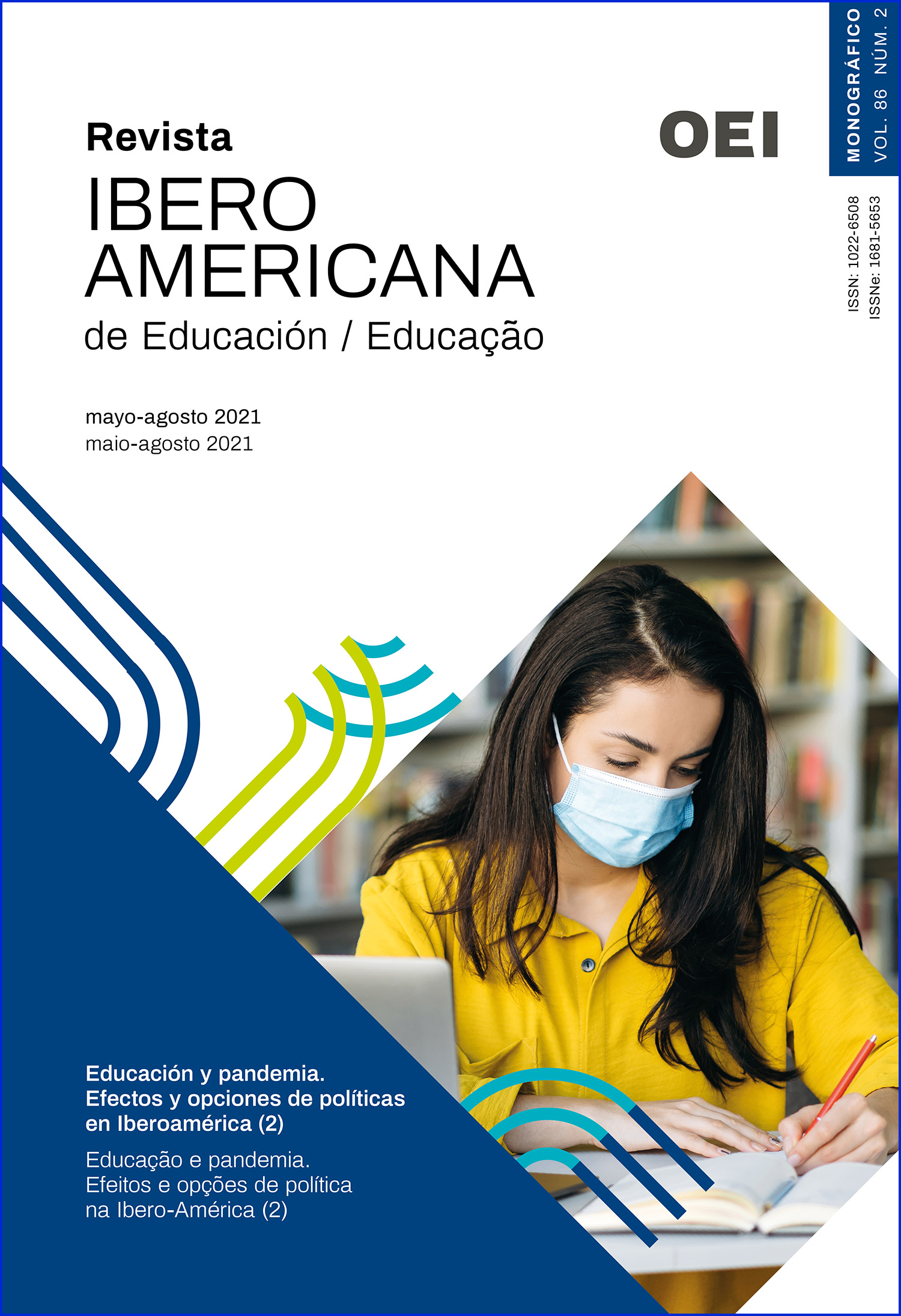O impacto da pandemia no ensino médio mexicano: uma análise desde o ponto de vista pedagógico, psicológico y tecnológico
DOI:
https://doi.org/10.35362/rie8624356Palavras-chave:
covid-19, ems, aprendizagem, habilidades socioemocionais, habilidades digitaisResumo
Este artigo descreve como as e os estudantes e docentes mexicanos de ensino médio - Educación Media Superior (EMS) - estão se adaptando à emergência sanitária provocada pela COVID-19. Para tal foram coletados dados de uma amostra de n=11,850 docentes e n= 39,582 estudantes que representam diferentes estados, instituições públicas e particulares localizadas em contextos urbanos e rurais mexicanos. Um questionário on-line analisou três dimensões: a pedagógica, a psicológica e a tecnológica. Entre as principais descobertas encontram-se as seguintes: pedagogicamente, docentes e estudantes foram flexíveis, ao adaptar métodos presenciais combinando recursos digitais e tradicionais. Tecnologicamente, só a metade dos docentes informam uma adequada conectividade a Internet, o que limita o uso dos recursos digitais. Psicologicamente, identifica-se uma prevalência de estados emocionais aflitivos e de estresse, ocasionando um estado de bem-estar socioemocional geral vulnerável. Através da análise de árvores de regressão foi revelada a importância da avaliação a aprendizagem e do contato com os estudantes, tanto para a aprendizagem como para o bem-estar socioemocional. A pesquisa é relevante porque permite ver fortalezas e áreas de oportunidade para o Sistema Educativo Mexicano
Downloads
Referências
Baptista-Lucio, P., Almazán-Zimerman, A., Loeza -Altamirano, C. A., López- Alcaraz, V.M. y Cárdenas -Domínguez, J.L. (2020). Encuesta Nacional a Docentes ante el COVID-19. Retos para la educación a distancia. Revista Latinoamericana De Estudios Educativos, 50(especial), 41-88. https://doi.org/10.48102/rlee.2020.50.ESPECIAL.96
CEPAL (2020). América Latina y el Caribe ante la pandemia del COVID-19: efectos económicos y sociales. Comisión Económica para América Latina y el Caribe. https://bit.ly/2W1NsyK.
Chen, Q., Liang, M., Li, Y., Guo, J., Fei, D., Wang, L., ... y Zhang, Z. (2020). Mental health care for medical staff in China during the COVID-19 outbreak. The Lancet Psychiatry, 7(4), e15-e16.
Crawford, J., Butler, K., Rudolph, J., Malkawi, B., Glowatz, M., Burton, R. y Lam, S. (2020). COVID-19: 20 countries’ higher education intra-period digital pedagogy responses. Journal of Applied Learning and Teaching, 3(1). Recuperado de https://bit.ly/3hTymE6
Díaz-Barriga, F. (2019). Dispositivos pedagógicos basados en la narrativa. Ciudad de México. México: SM.
Drisko, J. W., y Maschi, T. (2016). Content analysis. Estados Unidos: Oxford University Press.
Elizondo, A., Paredes, F. J. y Prieto, A. M. (2006). Enciclomedia: Un programa a debate. Revista Mexicana de Investigación Educativa, 11(28), 209–224. Recuperado de https://bit.ly/2V9jfNJ
Gifford, R. y Lacombe, C. (2006). Housing quality and children’s socioemotional health. Journal of Housing and the Built Environment, 21(2), 177-189. Recuperado de https://bit.ly/3i0WHHW
Hermans, H. J. (2010). Dialogical self. The Corsini Encyclopedia of Psychology, 1-3. https://doi.org/10.1002/9780470479216.corpsy0275
INEGI (2021). Resultados de la encuesta para la medición del impacto COVID-19 en la educación (ECOVID_ED). Comunicado de prensa número 185/21. Recuperado de https://bit.ly/3eKukvW
INEE (2017). La educación obligatoria en México. Informe 2017. México: INEE.
Jankowski, N. (2020). Assessment during a crisis: Responding to a global pandemic. Urbana, IL: University of Illinois and Indiana University, National Institute for Learning Outcomes Assessment.
Johnson, R.L. y Morgan, G.B. (2016). Survey scales: a guide to development, analysis and reporting. Estados Unidos: The Guilford Press.
Marek, M., Chew, C. y Wu, W. (2020). Teacher Experiences in Converting Classes to Distance Learning in the COVID-19 Pandemic. International Journal of Distance Education Technologies, 19(1), 40–60. https://doi.org/10.4018/ijdet.20210101.oa3
Mehrad, A. (2020) Post-traumatic stress disorder (PTSD) effect of coronavirus (COVID-19) pandemic and role of emotional intelligence. Journal Of Social Science Research, 15, 185-90. https://doi.org/10.24297/jssr.v15i.8750.
Monereo, C. (2010). La formación del profesorado: una pauta para el análisis e intervención a través de incidentes críticos. Revista Iberoamericana de Educación, 52(1), 149-178. https://doi.org/10.35362/rie520615
Plá, S. (2020). Apología por la escuela. Perfiles educativos, 42(170).
Ritschard, G. (2013). CHAID and earlier supervised tree methods. Contemporary Issues in Exploratory Data Mining in the Behavioral Sciences. London: Routledge, 48-74.
Román, F., Forés, A., Calandri, I., Gautreaux, R., Antúnez, A., Ordehi, D., ... & Allegri, R. (2020). Resiliencia de docentes en distanciamiento social preventivo obligatorio durante la pandemia de Covid-19. Journal of Neuroeducation, 1(1), 76-87.
Secretaría de Educación Pública (2020a). Boletín No. 84 Ofrece Educatel apoyo psicológico relacionado con el COVID-19. SEP. Recuperado de: https://bit.ly/2V5J4hG
Secretaría de Educación Pública (2020b). Boletín No. 118. No se paralizó el Sistema Educativo ante la pandemia de COVID-19; regresará a clases fortalecido: Esteban Moctezuma Barragán. SEP. Recuperado de https://bit.ly/3wZbo2s
Urrutia, M. E., Ortíz, S. y Jaimes, A. L. (2020). Emociones de docentes de la educación media superior ante los cambios del entorno durante el confinamiento por el COVID-19. Revista de Psicología, 2:187-196. Recuperado de https://bit.ly/3iC64Nz
Wang, C., Pan, R., Wan, X., Tan, Y., Xu, L., Ho, C. S. & Ho, R. C. (2020). Immediate psychological responses and associated factors during the initial stage of the 2019 coronavirus disease (COVID-19) epidemic among the general population in China. International journal of environmental research and public health, 17(5), 1729.
Zhou, L., Li, F., Wu, S. & Zhou, M. (2020). School’s Out, But Class’s On, The Largest Online Education in the World Today: Taking China’s Practical Exploration During The COVID-19 Epidemic Prevention and Control as An Example. Best Evid Chin Edu, 4(2), 501–519. https://doi.org/10.1017/CBO9781107415324.004
Como Citar
Publicado
Edição
Seção
Licença
Os(as) autores(as) que publiquem nesta revista concordam com os seguintes termos:















